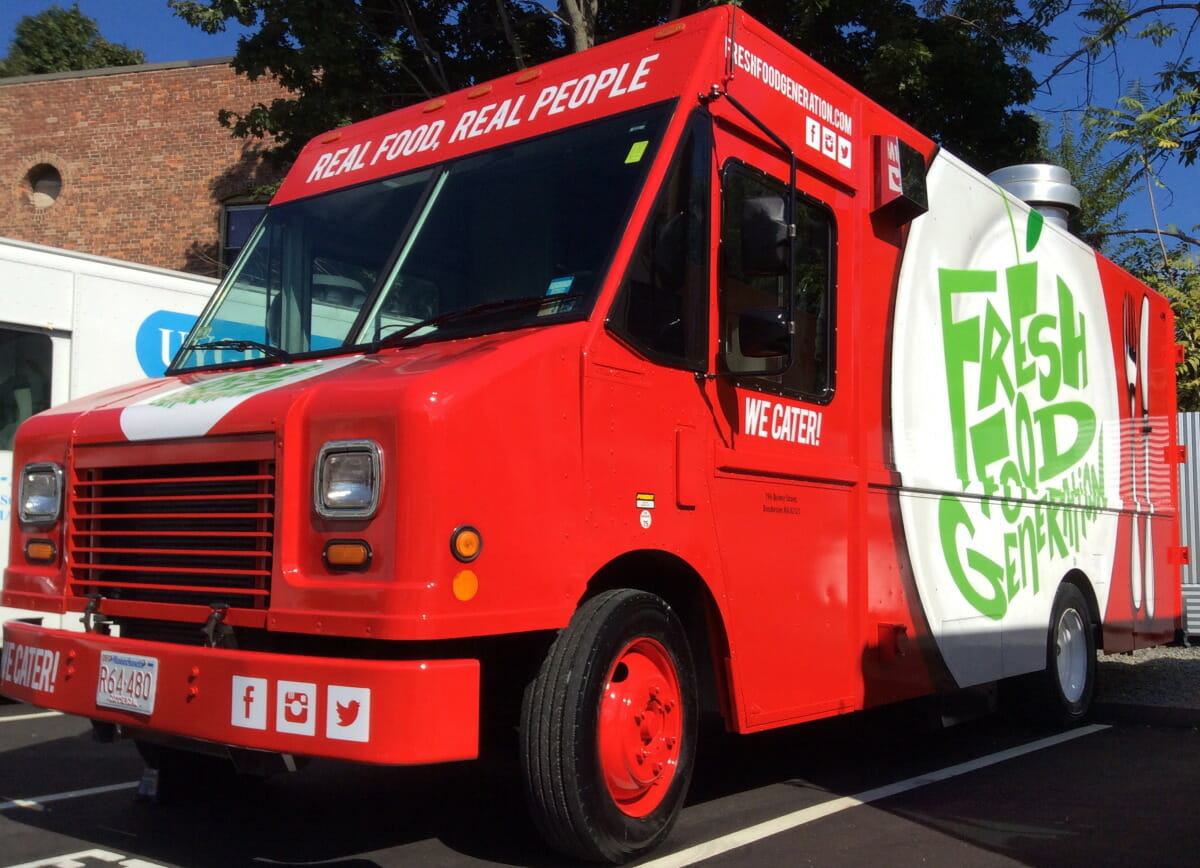The Farm-to-Street Revolution Is Almost Here
They might deal in gourmet grilled cheeses, Korean-Mexican fusion and chocolate-covered bacon, but rare is the food truck that also traffics in food justice.
The Farm-to-Street Revolution Is Almost Here
They might deal in gourmet grilled cheeses, Korean-Mexican fusion and chocolate-covered bacon, but rare is the food truck that also traffics in food justice.

Luckily, Cassandria Campbell and Jackson Renshaw have added “activism” to the chalkboard menu. The founders of Boston-based Fresh Food Generation aim to bring culturally appropriate, sustainable meals to lower-income areas of the city that typically lack for healthy food options.
The partnership was written in the adolescent stars. The duo met as high schoolers at The Food Project, a local nonprofit that brings together teens from diverse backgrounds to assist in sustainable food production. For both, it was a life-altering experience.
The mission of Fresh Food Generation is to bring culturally appropriate, sustainable meals to lower-income areas of the city.
“Before The Food Project, I didn’t really know what I was passionate about or what I wanted to do,” says Renshaw. Campbell came in with more knowledge but still felt her eyes opened: “I knew that there were a lot of people who didn’t have a lot to eat, in this country, in other countries, in Boston, so I was really interested in food bank work. It had just never occurred to me that the food that they were eating was actually harmful.” (Areas like Dorchester, Mattapan and Roxbury, three of Boston’s biggest neighborhoods, suffer from higher rates of diabetes and obesity.)
Their subsequent accomplishments presaged future roles as food justice trailblazers. Campbell went on to Swarthmore, returned to The Food Project as a development coordinator, then earned her master’s in city planning from MIT. Renshaw, meantime, studied ecological agriculture at the University of Vermont.
So what brought them back together? Campbell’s commuting stroke of genius. “I was working downtown, and the food truck scene was really popular,” she recalls. But living in Roxbury, a less solvent part of the city, “I realized that my food options were very limited and that I was traveling to other neighborhoods to get good food.” Creative eating options, mobile kitchens … the Fresh Food Generation seed was planted. Campbell then approached old friend Renshaw with the idea, he readily acquiesced, and the rolling revolution began.
But here’s the thing: neither Campbell nor Renshaw was a cook. By any stretch. As Campbell puts it, they had vision but “had never stood on their feet for hours chopping carrots.
“Jackson had a background in agriculture, I had a background in economic and urban planning, but neither one of us had a background in the culin
Did doubt creep in at any point in the process? “I think there were a few months where we had to convince ourselves that the idea was legit,” Campbell says with a laugh.
Outside supporters, however, were across-the-board enthusiastic. First, the pair won a pitch contest through Future Boston Accelerator Program, which supports local creative entrepreneurs (“We were the only food business in the group,” says Campbell). They then raised more than $50,000 via a Kickstarter campaign that concluded at the end of last year. They also built up strong word of mouth through catered events and public fundraising events.
“The idea is that the farm-to-plate movement is for everyone. It’s not just this thing that people with money can afford to do.”
As for the truck itself, Campbell and Renshaw acquired that sucker in Connecticut this spring and finally unveiled it earlier this month. “We have been really committed to making sure that people can relate to this farm-to-plate movement, so we’ve partnered with artists that in a lot of ways are much cooler than Cassandria and I,” Renshaw says, only half-jokingly. Local muralist Cedric Douglas designed the logo, and graffiti artist DEME5 painted the truck itself, including the back picture of a young boy, above which reads “Real Food, Real People.”
Their catering efforts formally launch in November; while the truck’s schedule is being finalized, the hope is to debut at the local winter farmer’s market that starts up in January. Meantime the duo will continue to prove that “sustainable” and “accessible” are not mutually exclusive food terms.
“The idea is that the farm-to-plate movement is for everyone,” Campbell says. “It’s not just this thing that people with money can afford to do.”
Follow us
This work is licensed under a Creative Commons Attribution-NoDerivatives 4.0 International License.
Want to republish a Modern Farmer story?
We are happy for Modern Farmer stories to be shared, and encourage you to republish our articles for your audience. When doing so, we ask that you follow these guidelines:
Please credit us and our writers
For the author byline, please use “Author Name, Modern Farmer.” At the top of our stories, if on the web, please include this text and link: “This story was originally published by Modern Farmer.”
Please make sure to include a link back to either our home page or the article URL.
At the bottom of the story, please include the following text:
“Modern Farmer is a nonprofit initiative dedicated to raising awareness and catalyzing action at the intersection of food, agriculture, and society. Read more at <link>Modern Farmer</link>.”
Use our widget
We’d like to be able to track our stories, so we ask that if you republish our content, you do so using our widget (located on the left hand side of the article). The HTML code has a built-in tracker that tells us the data and domain where the story was published, as well as view counts.
Check the image requirements
It’s your responsibility to confirm you're licensed to republish images in our articles. Some images, such as those from commercial providers, don't allow their images to be republished without permission or payment. Copyright terms are generally listed in the image caption and attribution. You are welcome to omit our images or substitute with your own. Charts and interactive graphics follow the same rules.
Don’t change too much. Or, ask us first.
Articles must be republished in their entirety. It’s okay to change references to time (“today” to “yesterday”) or location (“Iowa City, IA” to “here”). But please keep everything else the same.
If you feel strongly that a more material edit needs to be made, get in touch with us at [email protected]. We’re happy to discuss it with the original author, but we must have prior approval for changes before publication.
Special cases
Extracts. You may run the first few lines or paragraphs of the article and then say: “Read the full article at Modern Farmer” with a link back to the original article.
Quotes. You may quote authors provided you include a link back to the article URL.
Translations. These require writer approval. To inquire about translation of a Modern Farmer article, contact us at [email protected]
Signed consent / copyright release forms. These are not required, provided you are following these guidelines.
Print. Articles can be republished in print under these same rules, with the exception that you do not need to include the links.
Tag us
When sharing the story on social media, please tag us using the following: - Twitter (@ModFarm) - Facebook (@ModernFarmerMedia) - Instagram (@modfarm)
Use our content respectfully
Modern Farmer is a nonprofit and as such we share our content for free and in good faith in order to reach new audiences. Respectfully,
No selling ads against our stories. It’s okay to put our stories on pages with ads.
Don’t republish our material wholesale, or automatically; you need to select stories to be republished individually.
You have no rights to sell, license, syndicate, or otherwise represent yourself as the authorized owner of our material to any third parties. This means that you cannot actively publish or submit our work for syndication to third party platforms or apps like Apple News or Google News. We understand that publishers cannot fully control when certain third parties automatically summarize or crawl content from publishers’ own sites.
Keep in touch
We want to hear from you if you love Modern Farmer content, have a collaboration idea, or anything else to share. As a nonprofit outlet, we work in service of our community and are always open to comments, feedback, and ideas. Contact us at [email protected].by Meaghan Agnew, Modern Farmer
October 28, 2014
Modern Farmer Weekly
Solutions Hub
Innovations, ideas and inspiration. Actionable solutions for a resilient food system.
ExploreExplore other topics
Share With Us
We want to hear from Modern Farmer readers who have thoughtful commentary, actionable solutions, or helpful ideas to share.
SubmitNecessary cookies are absolutely essential for the website to function properly. This category only includes cookies that ensures basic functionalities and security features of the website. These cookies do not store any personal information.
Any cookies that may not be particularly necessary for the website to function and are used specifically to collect user personal data via analytics, ads, other embedded contents are termed as non-necessary cookies.